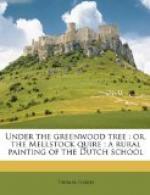“Dear Mr. Maybold,—I have been thinking seriously and sadly through the whole of the night of the question you put to me last evening and of my answer. That answer, as an honest woman, I had no right to give.
“It is my nature—perhaps all women’s—to love refinement of mind and manners; but even more than this, to be ever fascinated with the idea of surroundings more elegant and pleasing than those which have been customary. And you praised me, and praise is life to me. It was alone my sensations at these things which prompted my reply. Ambition and vanity they would be called; perhaps they are so.
“After this explanation I
hope you will generously allow me to
withdraw the answer I too hastily
gave.
“And one more request. To keep the meeting of last night, and all that passed between us there, for ever a secret. Were it to become known, it would utterly blight the happiness of a trusting and generous man, whom I love still, and shall love always.—Yours sincerely,
“Fancy day.
The last written communication that ever passed from the vicar to Fancy, was a note containing these words only:
“Tell him everything; it is best. He will forgive you.”
PART THE FIFTH: CONCLUSION
CHAPTER I: ‘THE KNOT THERE’S NO UNTYING’
The last day of the story is dated just subsequent to that point in the development of the seasons when country people go to bed among nearly naked trees, are lulled to sleep by a fall of rain, and awake next morning among green ones; when the landscape appears embarrassed with the sudden weight and brilliancy of its leaves; when the night-jar comes and strikes up for the summer his tune of one note; when the apple-trees have bloomed, and the roads and orchard-grass become spotted with fallen petals; when the faces of the delicate flowers are darkened, and their heads weighed down, by the throng of honey-bees, which increase their humming till humming is too mild a term for the all-pervading sound; and when cuckoos, blackbirds, and sparrows, that have hitherto been merry and respectful neighbours, become noisy and persistent intimates.
The exterior of Geoffrey Day’s house in Yalbury Wood appeared exactly as was usual at that season, but a frantic barking of the dogs at the back told of unwonted movements somewhere within. Inside the door the eyes beheld a gathering, which was a rarity indeed for the dwelling of the solitary wood-steward and keeper.




